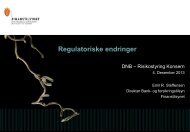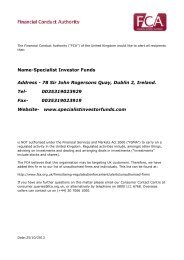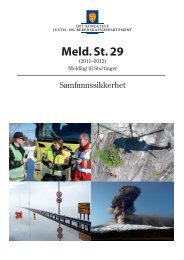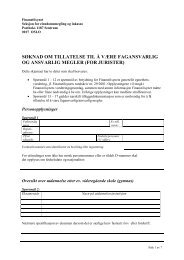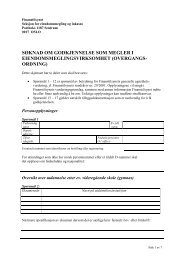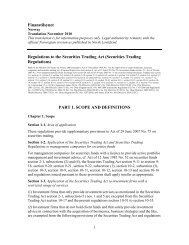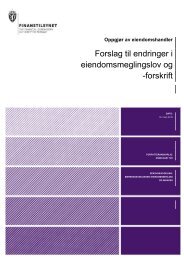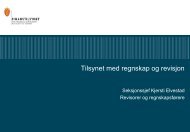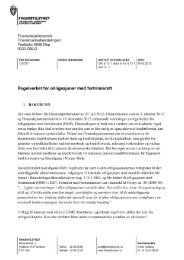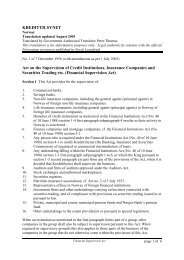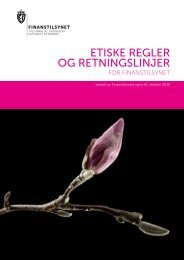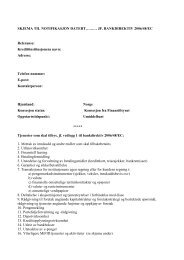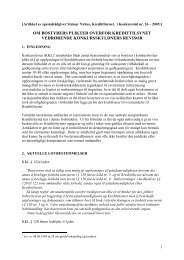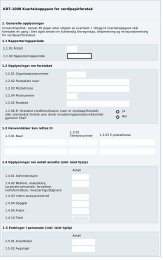Rapport om gjennomføring av AIFMD i norsk rett - Finanstilsynet
Rapport om gjennomføring av AIFMD i norsk rett - Finanstilsynet
Rapport om gjennomføring av AIFMD i norsk rett - Finanstilsynet
You also want an ePaper? Increase the reach of your titles
YUMPU automatically turns print PDFs into web optimized ePapers that Google loves.
EN<br />
L 174/2 Official Journal of the European Union 1.7.2011<br />
uncertain and difficult to predict due to the lack of<br />
previous experience in this regard, a review mechanism<br />
should be provided for. It is intended that, after a transitional<br />
period of 2 years, a harmonised passport regime<br />
bec<strong>om</strong>e applicable to non-EU AIFMs performing<br />
management and/or marketing activities within the<br />
Union and EU AIFMs managing non-EU AIFs after the<br />
entry into force of a delegated act by the C<strong>om</strong>mission in<br />
this regard. It is intended that the harmonised regime,<br />
during a further transitional period of 3 years, co-exist<br />
with the national regimes of the Member States subject<br />
to certain minimum harmonised conditions. After that<br />
3-year period of co-existence, it is intended that the<br />
national regimes be brought to an end on the entry<br />
into force of a further delegated act by the C<strong>om</strong>mission.<br />
(5) 4 years after the deadline for transposition of this<br />
Directive, the C<strong>om</strong>mission should review the application<br />
and the scope of this Directive taking into account its<br />
objectives and should assess whether or not the Union<br />
harmonised approach has caused any ongoing major<br />
market disruption and whether or not this Directive<br />
functions effectively in light of the principles of the<br />
internal market and of a level playing field.<br />
(6) The scope of this Directive should be limited to entities<br />
managing AIFs as a regular business – regardless of<br />
whether the AIF is of an open-ended or a closed-ended<br />
type, whatever the legal form of the AIF, and whether or<br />
not the AIF is listed – which raise capital fr<strong>om</strong> a number<br />
of investors with a view to investing that capital for the<br />
benefit of those investors in accordance with a defined<br />
investment policy.<br />
(7) Investment undertakings, such as family office vehicles<br />
which invest the private wealth of investors without<br />
raising external capital, should not be considered to be<br />
AIFs in accordance with this Directive.<br />
(8) The entities not considered to be AIFMs pursuant to this<br />
Directive fall outside its scope. As a consequence, this<br />
Directive should not apply to holding c<strong>om</strong>panies as<br />
defined herein. However, managers of private equity<br />
funds or AIFMs managing AIFs whose shares are<br />
admitted to trading on a regulated market should not<br />
be excluded fr<strong>om</strong> its scope. Further, this Directive<br />
should not apply to the management of pension funds;<br />
employee participation or s<strong>av</strong>ings schemes; supranational<br />
institutions; national central banks; national, regional and<br />
local governments and bodies or institutions which<br />
manage funds supporting social security and pension<br />
systems; securitisation special purpose entities; or<br />
insurance contracts and joint ventures.<br />
(9) Investment firms authorised under Directive 2004/39/EC<br />
of the European Parliament and of the Council of<br />
21 April 2004 on markets in financial instruments ( 1 )<br />
and credit institutions authorised under Directive<br />
2006/48/EC of the European Parliament and of the<br />
Council of 14 June 2006 relating to the taking up and<br />
pursuit of the business of credit institutions ( 2 ) should<br />
not be required to obtain an authorisation under this<br />
Directive in order to provide investment services such<br />
as individual portfolio management in respect of AIFs.<br />
However, investment firms should be able, directly or<br />
indirectly, to offer units or shares of an AIF to, or<br />
place such units or shares with, investors in the Union<br />
only to the extent that the units or shares can be<br />
marketed in accordance with this Directive. When transposing<br />
this Directive into national law, the Member<br />
States should take into account the regulatory purpose<br />
of that requirement and should ensure that investment<br />
firms established in a third country that, pursuant to the<br />
relevant national law, can provide investment services in<br />
respect of AIFs also fall within the scope of that<br />
requirement. The provision of investment services by<br />
those entities in respect of AIFs should never amount<br />
to a de facto circumvention of this Directive by means<br />
of turning the AIFM into a letter-box entity, irrespective<br />
of whether the AIFM is established in the Union or in a<br />
third country.<br />
(10) This Directive does not regulate AIFs. AIFs should<br />
therefore be able to continue to be regulated and<br />
supervised at national level. It would be disproportionate<br />
to regulate the structure or c<strong>om</strong>position of the portfolios<br />
of AIFs managed by AIFMs at Union level and it would<br />
be difficult to provide for such extensive harmonisation<br />
due to the very diverse types of AIFs managed by AIFMs.<br />
This Directive therefore does not prevent Member States<br />
fr<strong>om</strong> adopting or fr<strong>om</strong> continuing to apply national<br />
requirements in respect of AIFs established in their<br />
territory. The fact that a Member State may impose<br />
requirements additional to those applicable in other<br />
Member States on AIFs established in its territory<br />
should not prevent the exercise of rights of AIFMs authorised<br />
in accordance with this Directive in other Member<br />
States to market to professional investors in the Union<br />
certain AIFs established outside the Member State<br />
imposing additional requirements and which are<br />
therefore not subject to and do not need to c<strong>om</strong>ply<br />
with those additional requirements.<br />
(11) Several provisions of this Directive require AIFMs to<br />
ensure c<strong>om</strong>pliance with requirements for which, in<br />
s<strong>om</strong>e fund structures, AIFMs are not responsible. An<br />
example of such fund structures is where the responsibility<br />
for appointing the depositary rests with the AIF or<br />
another entity acting on behalf of the AIF. In such cases,<br />
the AIFM has no ultimate control over whether a<br />
depositary is in fact appointed unless the AIF is internally<br />
( 1 ) OJ L 145, 30.4.2004, p. 1.<br />
( 2 ) OJ L 177, 30.6.2006, p. 1.



